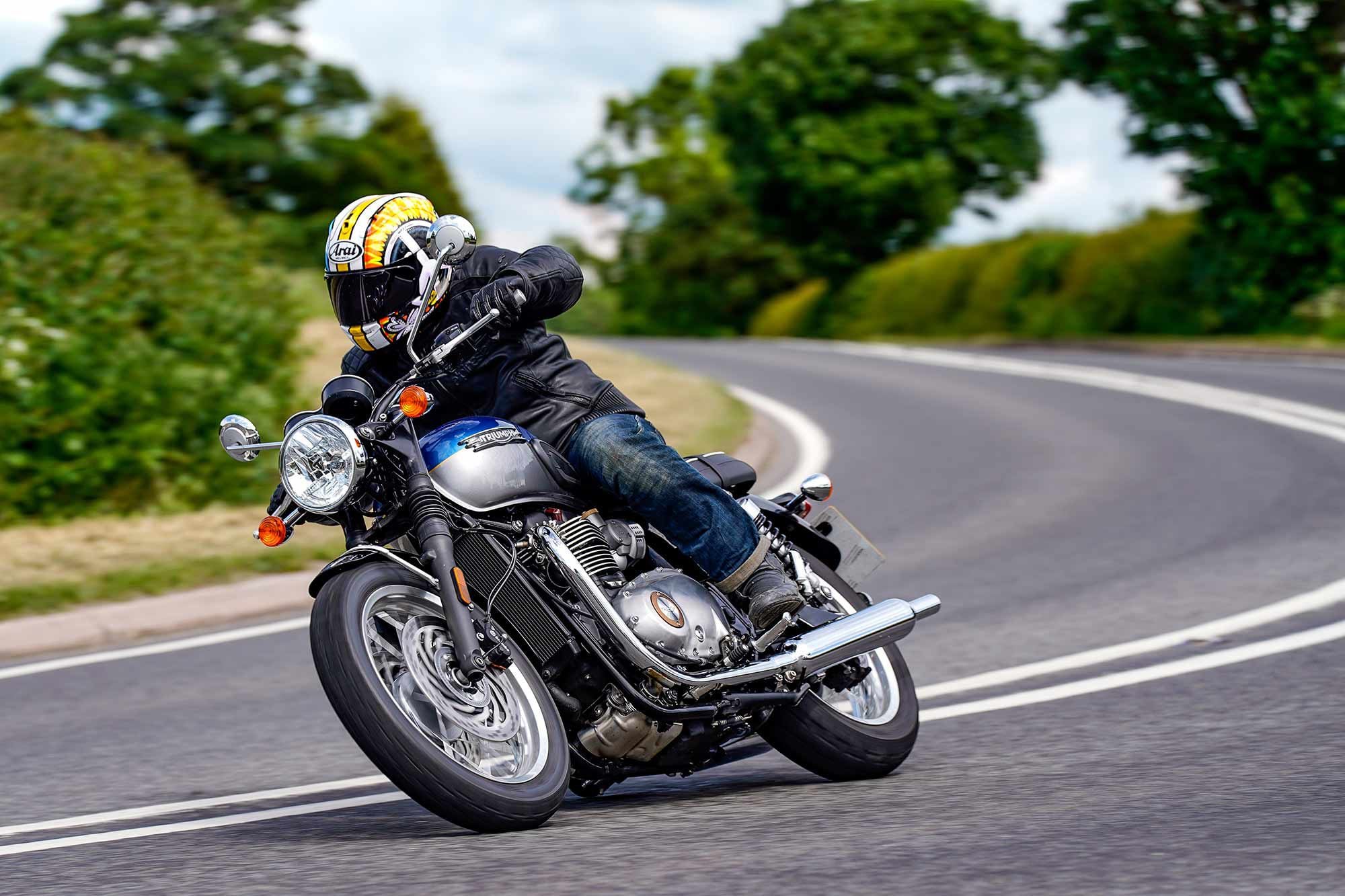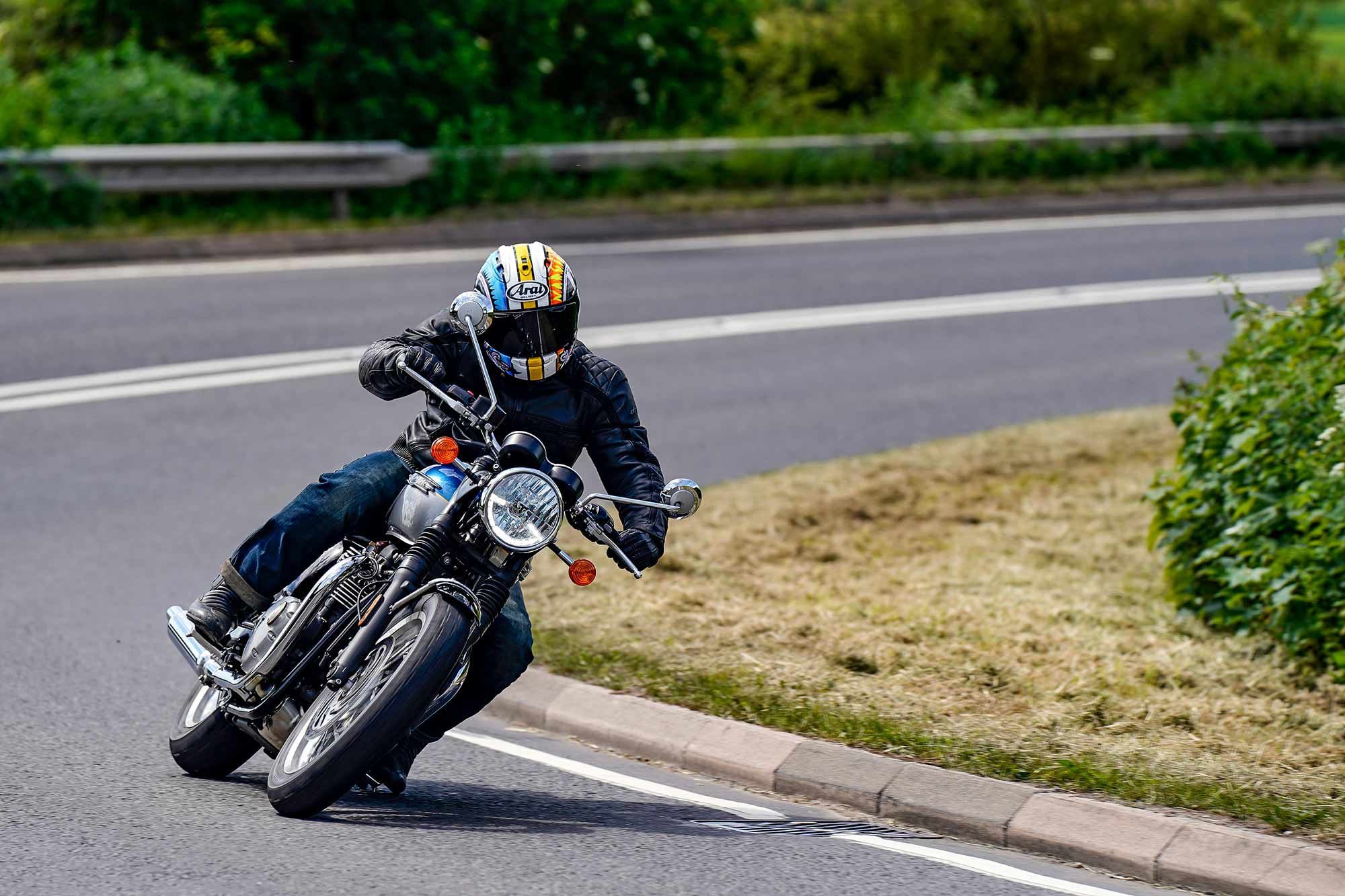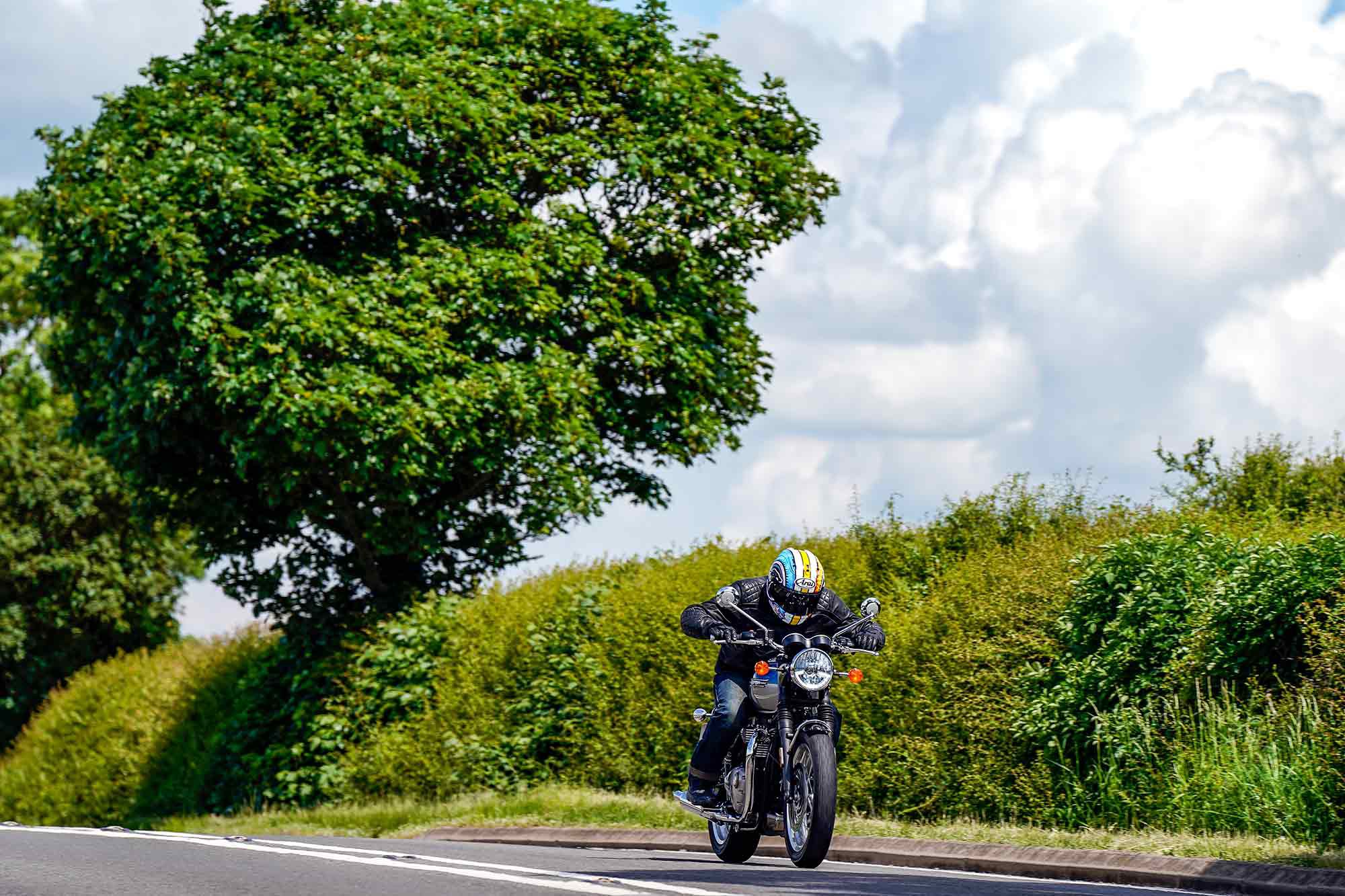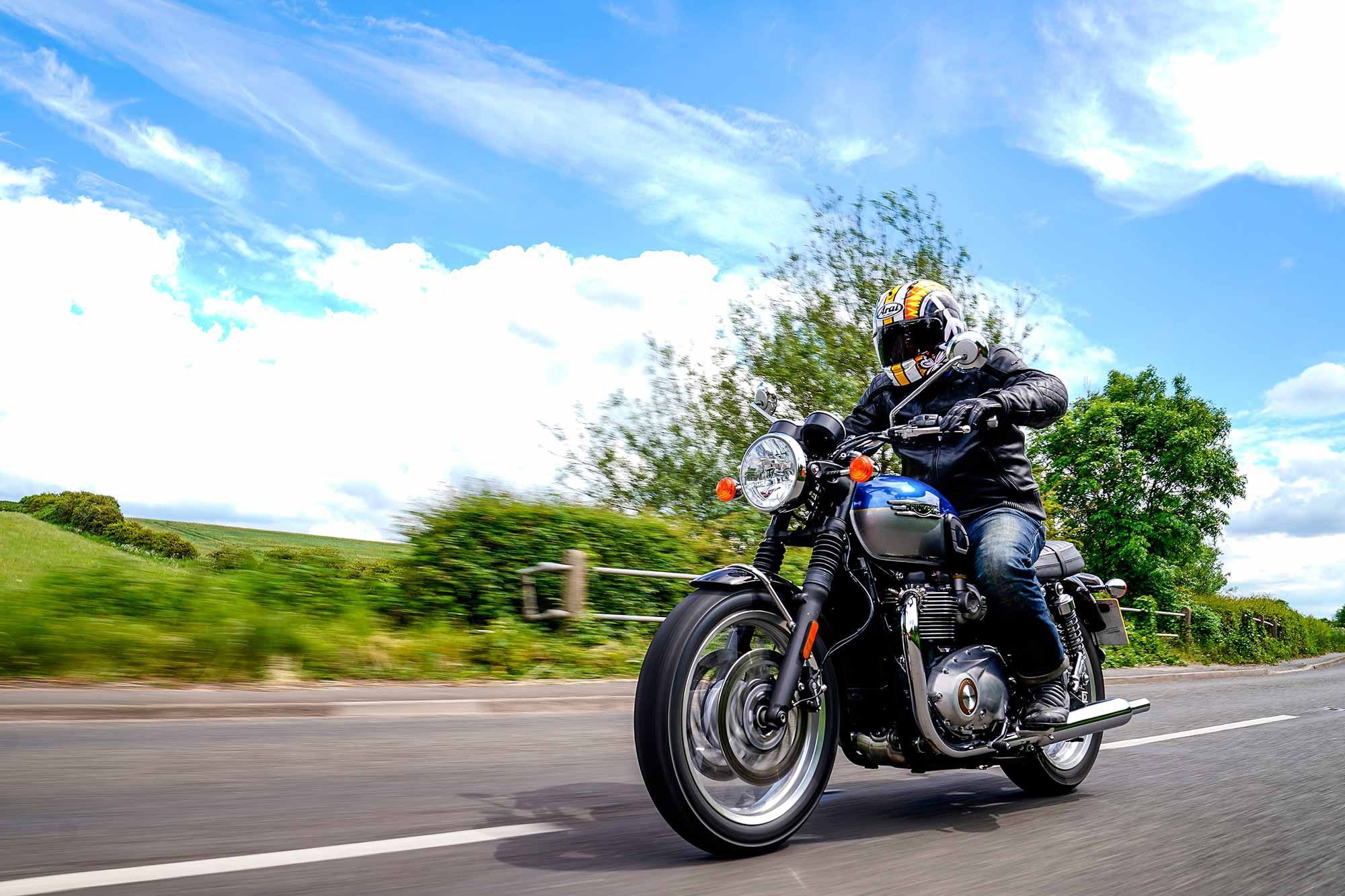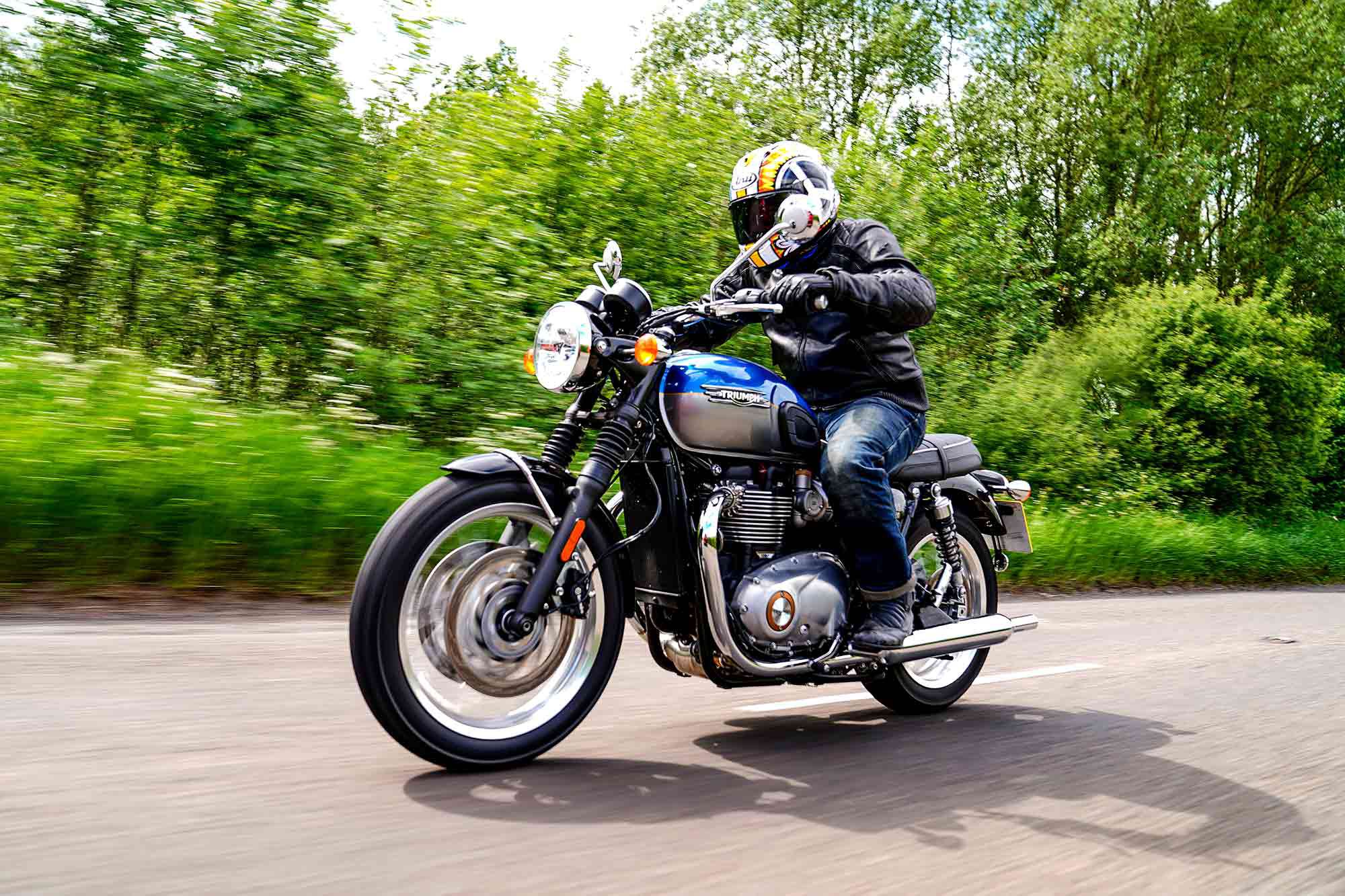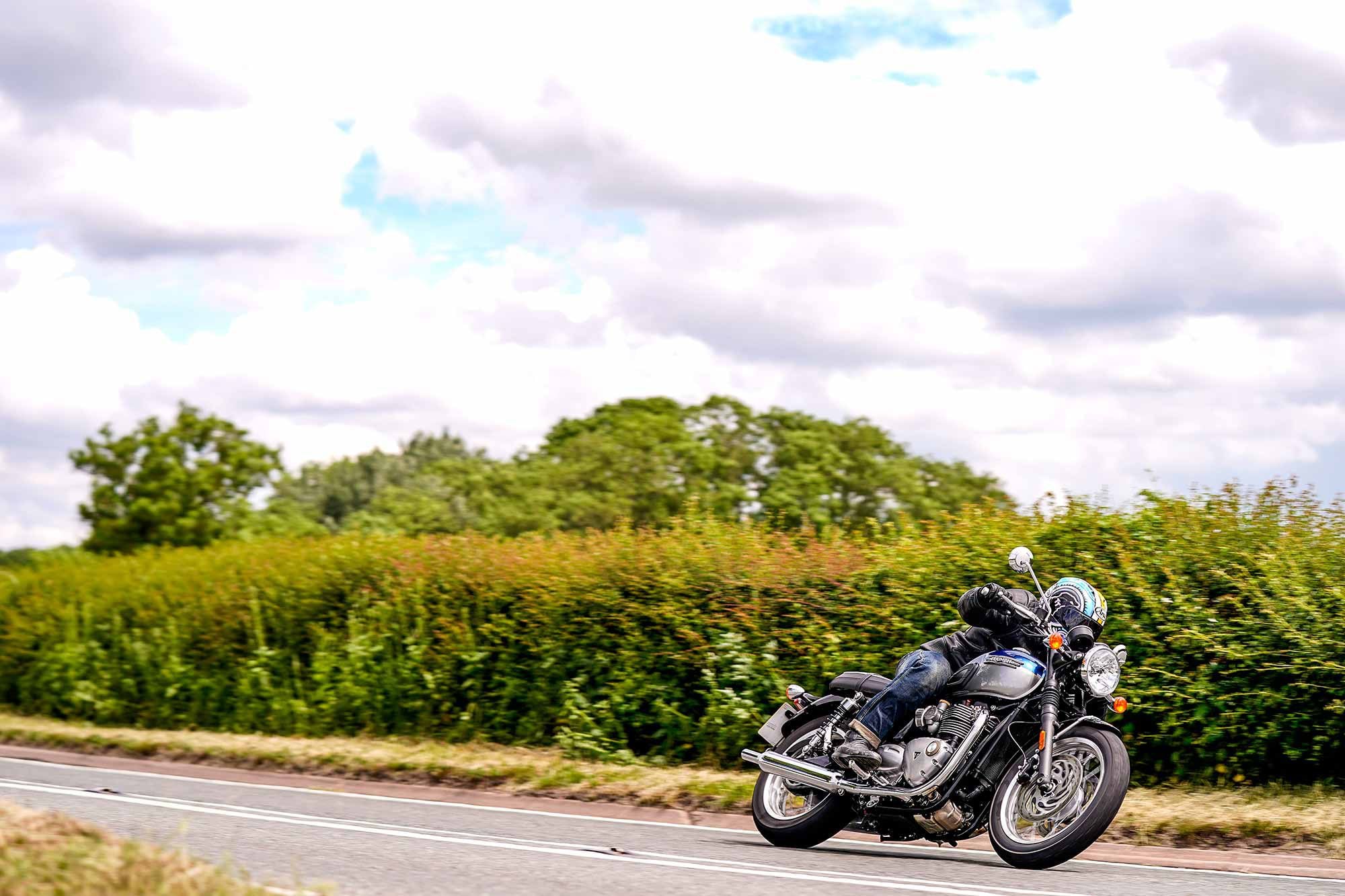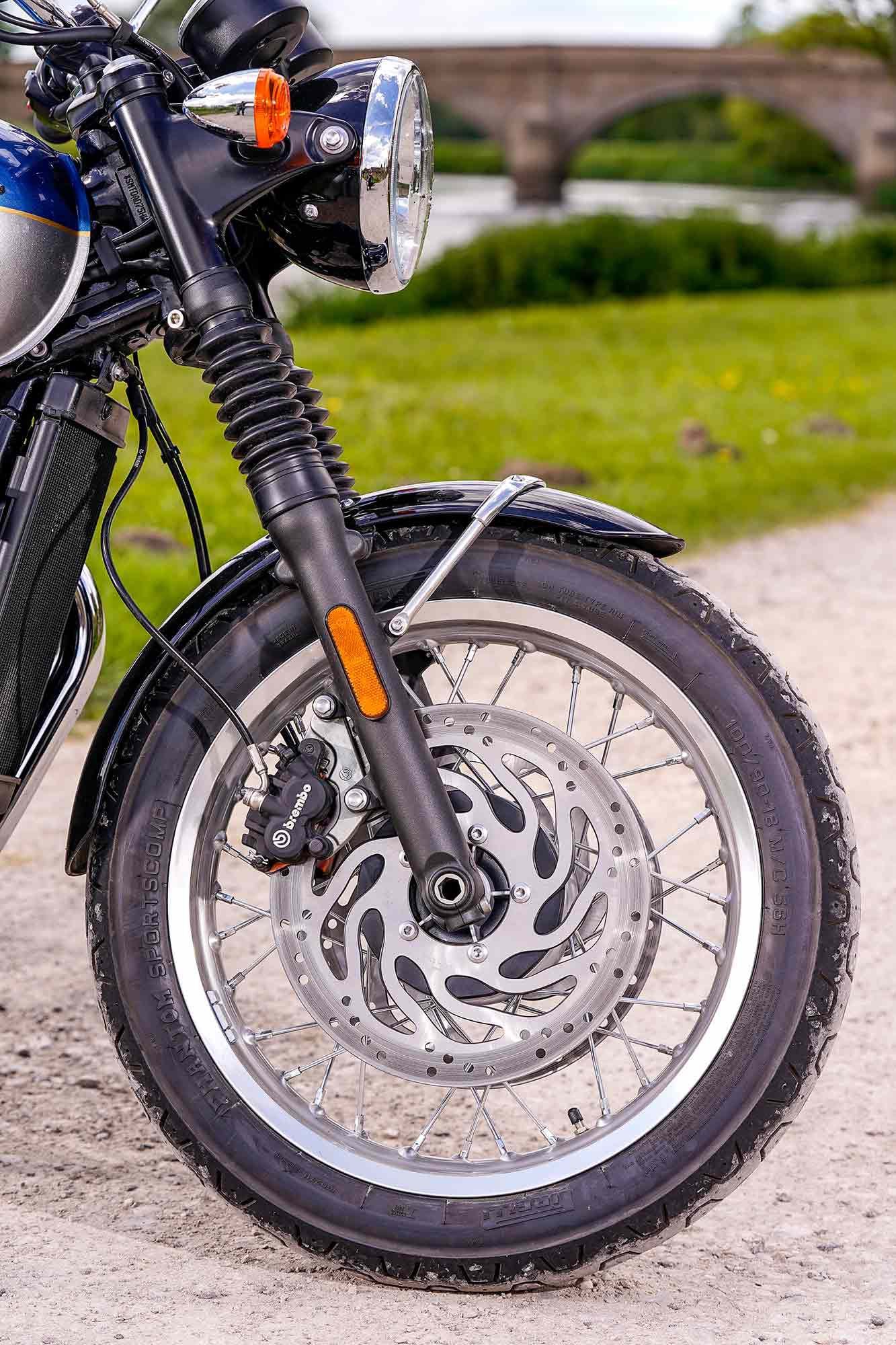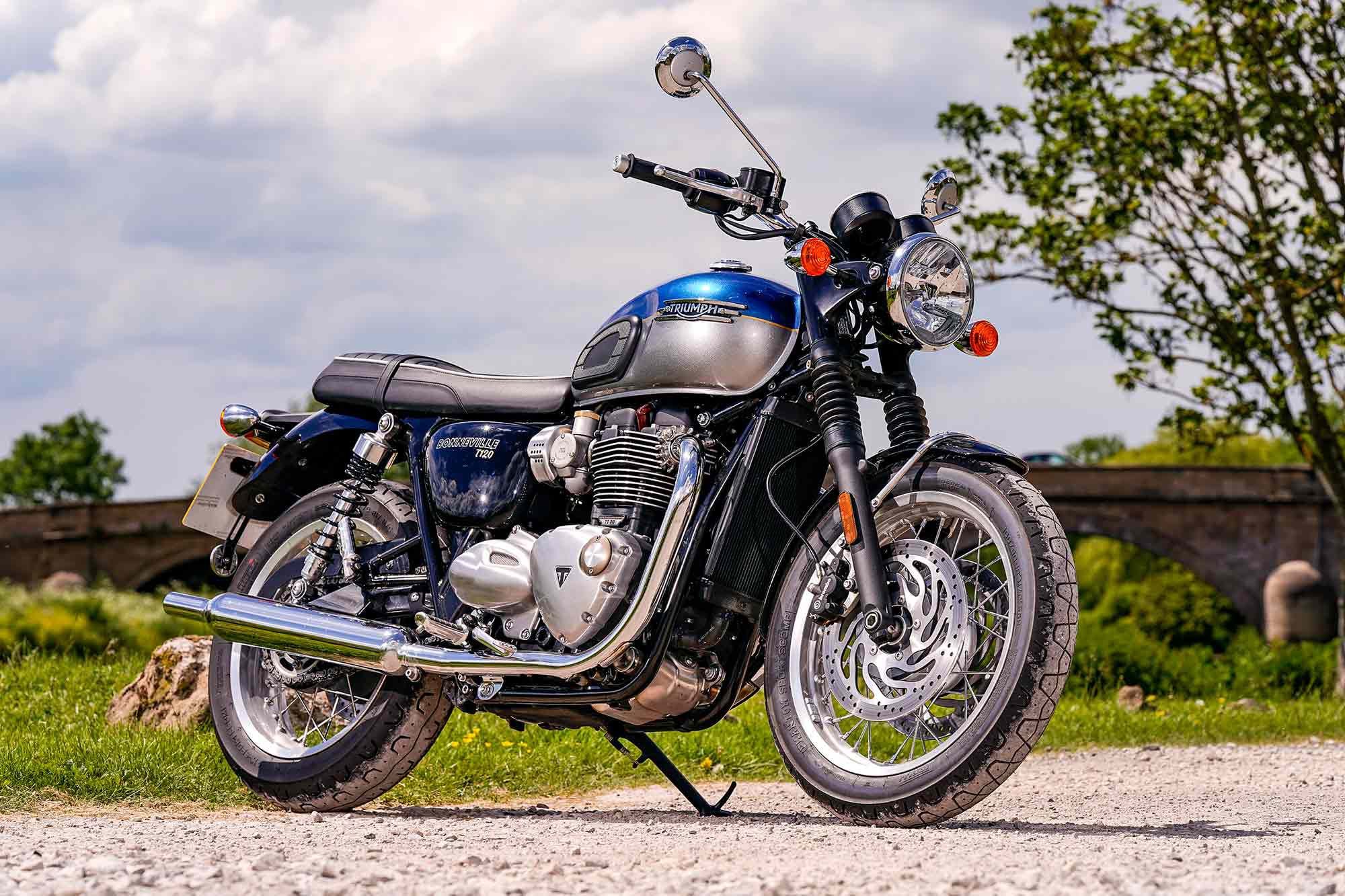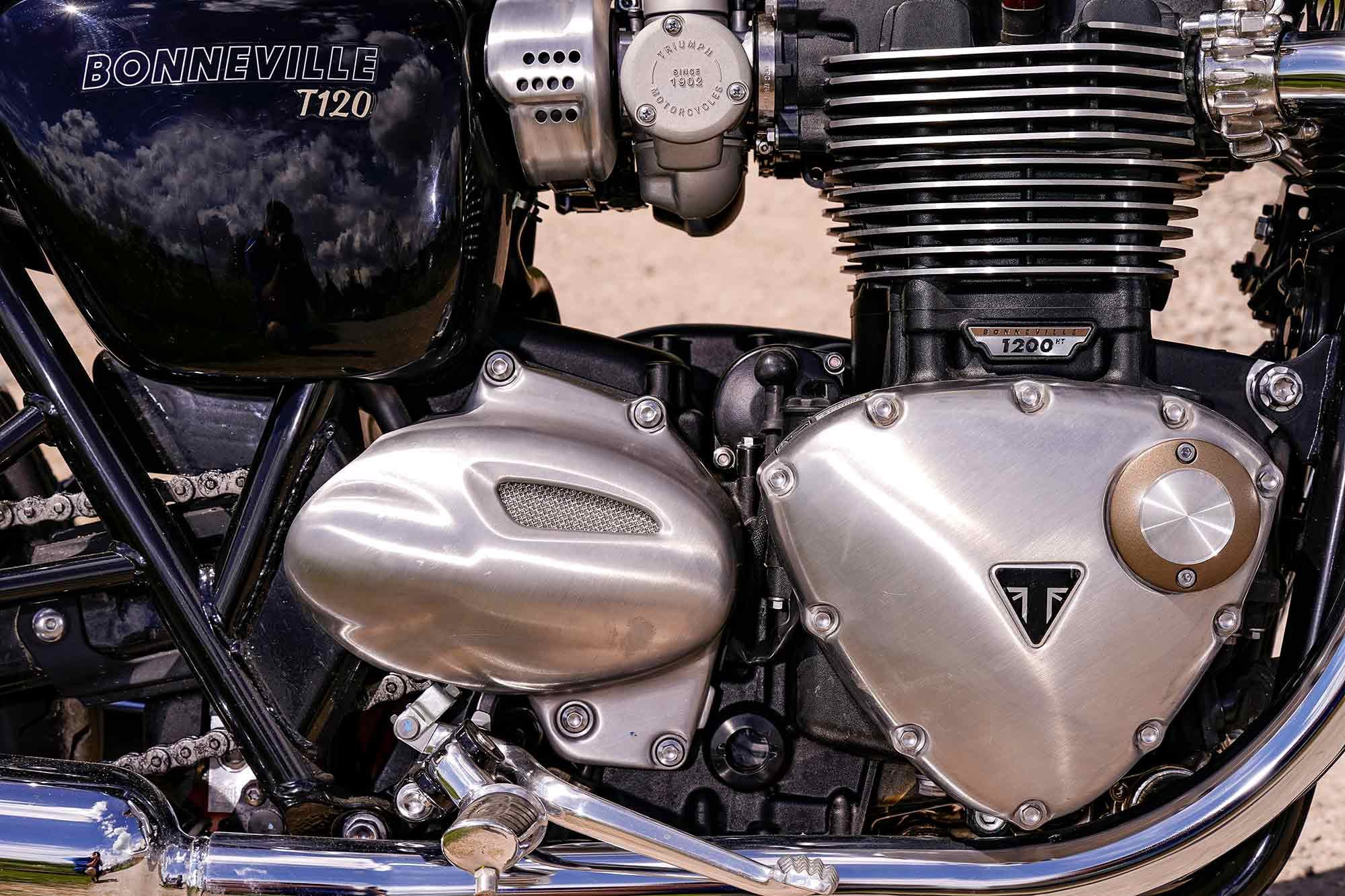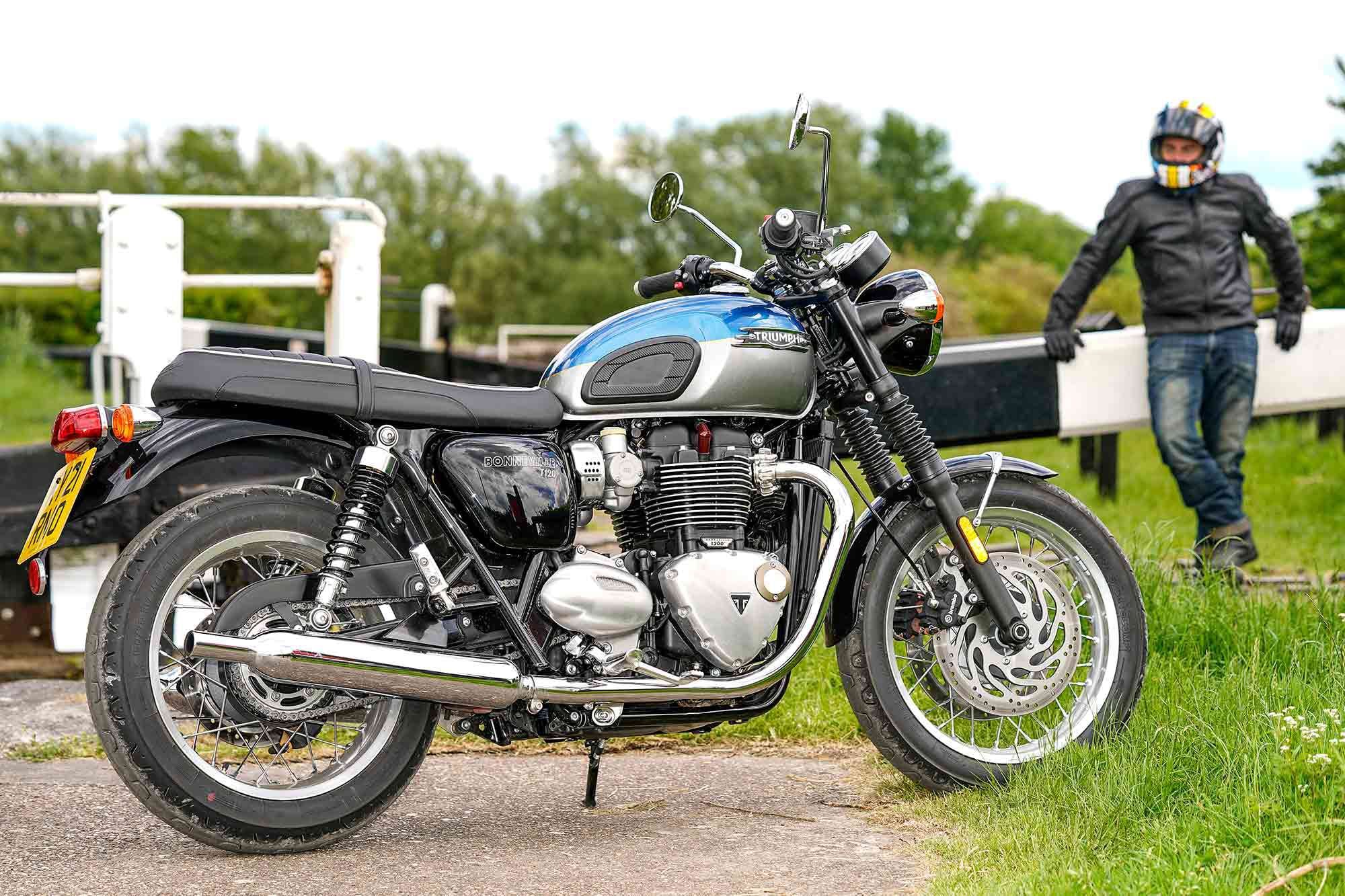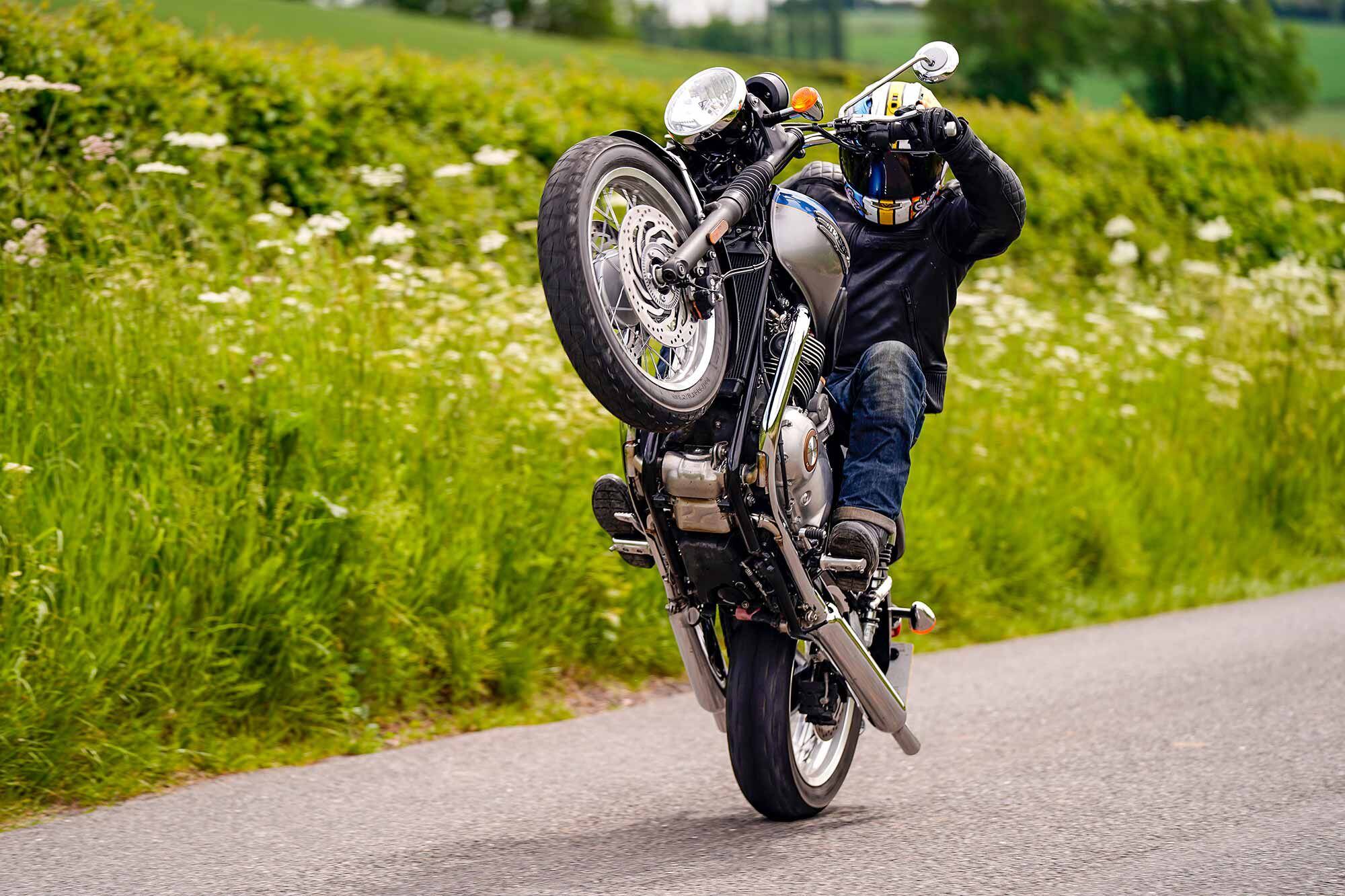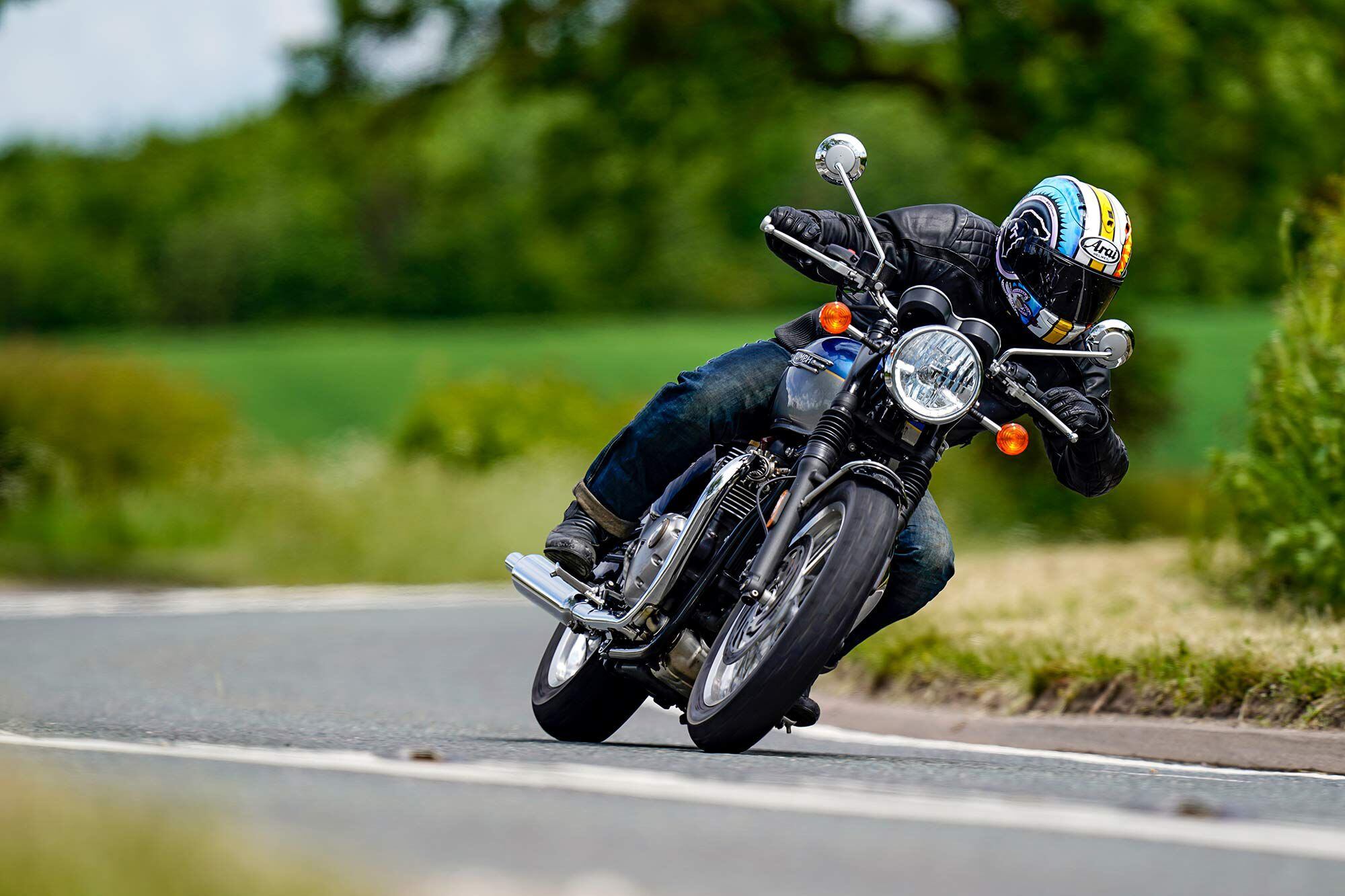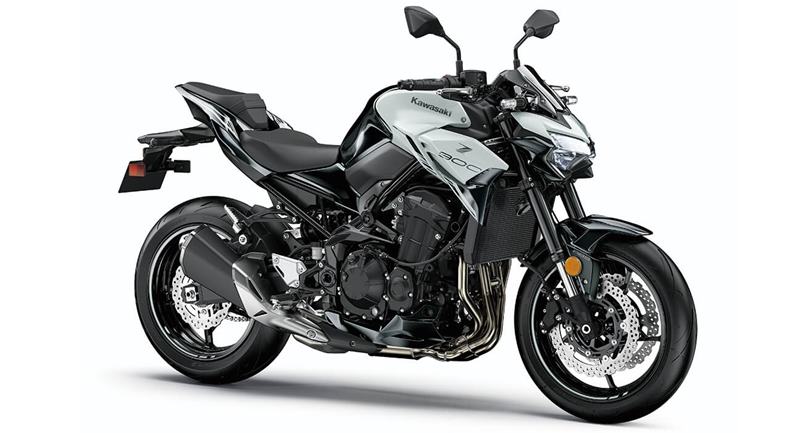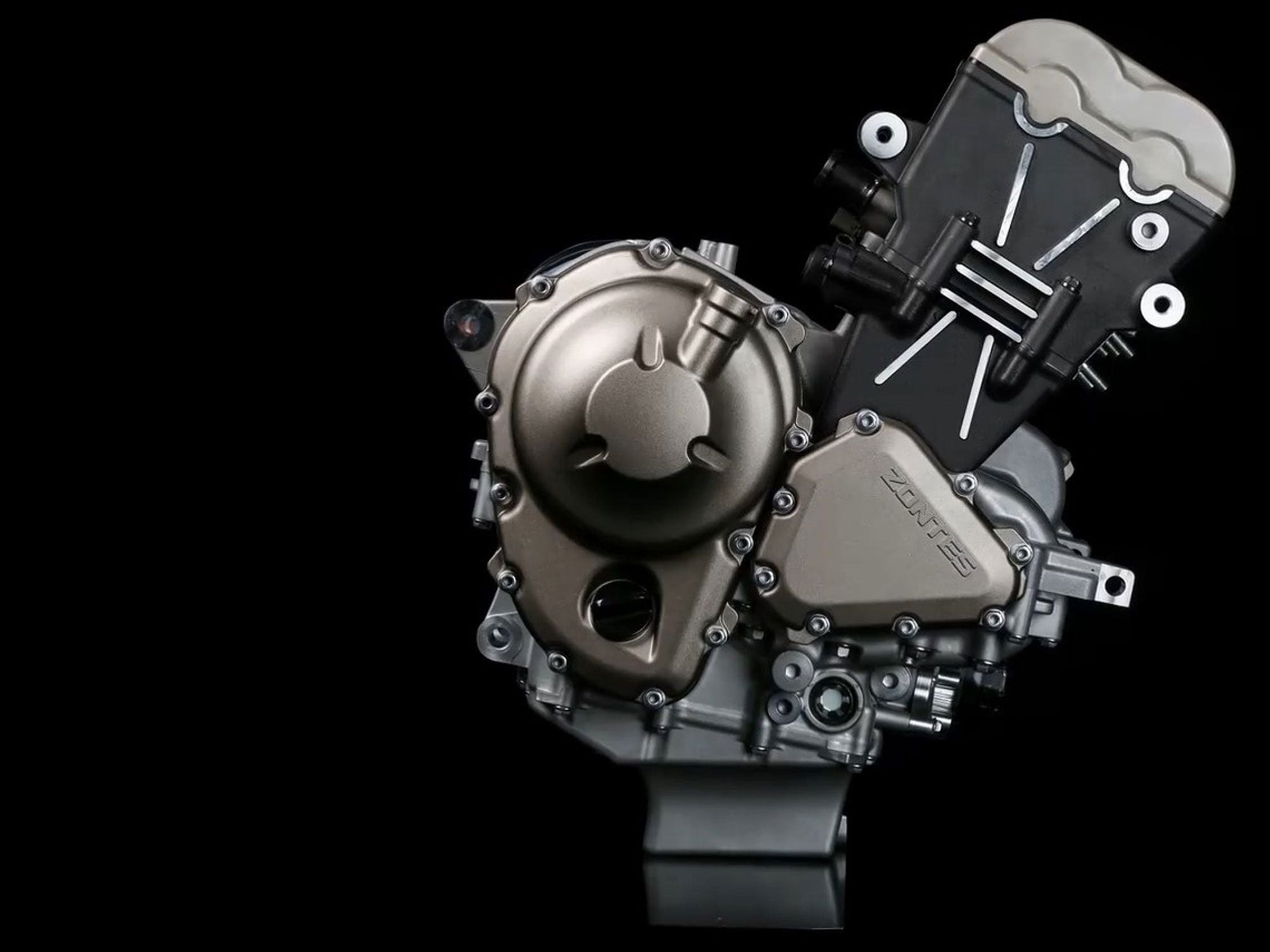Arguably the closest competitor to 2022 Triumph Bonneville T120 is its own T100. The T100 is a 900cc parallel-twin as opposed to the 1,200cc unit housed in the T120. (Tim Keeton/Impact Images/)
Summertime with the Triumph Bonneville T120. Is there a more textbook jacket-and-jeans standard out there? Even for old racers like me it’s nice to get out of the one-piece leathers, stop chasing the stopwatch, and take it easy. I’ve always celebrated Triumph’s Bonneville T120 (so-called because it was the first Bonneville capable of a 120 mph top speed…ish), and for 2021, the British manufacturer has significantly improved the bigger Bonnie, as I was lucky enough to spend a week finding out.
The lower capacity of the T100 results in lower peak power (by 11 bhp) and torque (16 pound-feet) that’s also produced higher up in the rev range. The T100 has a less attractive spec too, with just a single front brake disc, no electronic riding mode options, and no cruise control—but it is $1,550 cheaper. (Tim Keeton/Impact Images/)
Peak power and torque are the same as the previous T120 model: 79 hp at 6,500 rpm and 75 pound-feet at 3,500 rpm. But those on-paper figures only tell half the story, as the responsiveness of the British twin has been sharpened. Triumph has reduced the weight of the crankshaft and, with developments to the balance shaft and clutch, produced an engine that is more responsive and revs more freely.
With 116 official accessories to lure you, it will be hard to leave the showroom on a standard bike. There is also a rather attractive black version. (Tim Keeton/Impact Images/)
It’s easy to get romantic about the evocative and nostalgic styling and forget there is a strong 1,200cc British twin driving you forward. There is serious grunt in there, even low down in the rev range, while the updated, free-spinning motor also adds urgent drive.
This wider spread of torque and new responsiveness make the T120 entertaining to ride. A pace of 100 mph is easily achievable, 110 mph isn’t a problem, and even 120 mph—tucked in and lying prone over the twist-off fuel cap—is not out of reach. Yes, I know this is not how a T120 should be ridden, but like driving a classic V-8, it’s nice to know it can still kick ass when required.
Service intervals of 10,000 miles should reduce the cost of ownership for the owner, which moved up from 6,000 miles in 2016. (Tim Keeton/Impact Images/)
That extra helping of torque comes in useful for overtakes and shrugs off the added load of a pillion with ease. At 75 mph, the analog rev counter hovers around 3,000 rpm, the motor barely working as the bike cruises effortlessly. Cruise control now comes as standard and is easy to operate: Simply press one button and your speed is set. You can’t accelerate or decelerate once the cruise control is triggered, which is a little disappointing, but arguably most owners will like the system’s user-friendly simplicity.
The bigger Bonnie gets six gears, one more than the T100’s five-speed gearbox. (Tim Keeton/Impact Images/)
As much as I rate the new Euro 5 engine, the fuelling and throttle response are a little snatchy, which may be down to the new lighter engine internals. Switching into Rain mode (doable on the move) delivers a softer throttle response and is especially useful in the city. I’d also like a little bit more soul from the sculpted twin exhausts, which do a great job of hiding the new cat-converter but, acoustically speaking, lack a little character.
The British designers have managed to chop 15 pounds in total, which includes a 4.4-pound weight saving on new 32-spoke wheels. (Tim Keeton/Impact Images/)
Chassis-wise, new, lightweight spoke wheels and aluminum rims have reduced unsprung weight, allowing the T120 to steer quicker. You especially feel this at speed as the 2021 bike is significantly easier to flick from one side to the other. (Don’t get too carried away, though, because the bigger Bonnie will soon start to drag its pegs.)
The grip and feel from the Pirelli Phantom rubber is strong, but the ground clearance isn’t. (Tim Keeton/Impact Images/)
For all its agility at pace, however, the overall weight of the bike is more apparent at slow speed. The low seat height and friendly ergonomics make the T120 accessible for new and inexperienced riders, but there is no hiding that at 520 pounds it is a heavy bike—one that also feels a little top-heavy compared to the similar retro competition.
Triumph quotes 50 mpg (US), and I averaged 49 mpg (US), and for the majority of the test I was overriding the T120. I’d estimate most riders will attain more than 50 mpg. (Tim Keeton/Impact Images/)
New sliding-caliper Brembo front stoppers, along with those lighter wheels, have enhanced the T120′s stopping performance. The front brakes have good feel, while both brake and clutch levers are span adjustable. Riders moving to the Bonnie from a sportbike might feel they lack sharpness, the setup is efficient and proportional.
Conventional (non-lean sensitive) ABS comes as standard, and the older Nissin caliper remains at the rear. (Tim Keeton/Impact Images/)
Two riding modes, Rain and Road, come as standard, which is not a feature on the T100. The modes don’t change the power output but do change the amount of TC and ABS (neither of which is lean sensitive).
Related: Motorcycle Reviews And Comparisons
There is no IMU on the T120, which means the rider aids are not lean sensitive. (Tim Keeton/Impact Images/)
Verdict
For 2021 Triumph has carefully and thoughtfully enhanced the existing T120 street bike by giving it a gentle refresh rather than a complete makeover. The engine feels livelier but, for me, the lighter handling at speed and improved brakes—along with the now standard cruise control—are the big wins.
The switch gear is simple and the clear analog clocks give adequate information. There is also a USB charging point under the seat. (Tim Keeton/Impact Images/)
Some may feel that the Triumph lacks in the high-tech stakes and is down on power compared to some of the competition, but I love the T120 styling and heritage. We’ve only touched on the T120′s iconic looks and the nostalgia it engenders, but, fact is, it turns heads everywhere. And I couldn’t get enough of the enlivened chassis and its sparkling handling.
The T120 is one of Triumph’s finest retro machines to date.
Triumph has reduced the weight of the crankshaft and, with improvements to the balance shaft and clutch, produced an engine that is more responsive and revs more freely. (Tim Keeton/Impact Images/)
2022 Triumph Bonneville T120 Technical Specifications and Price
| PRICE | $12,050 |
| ENGINE | 1,200cc, SOHC, liquid-cooled parallel twin; 4-valves/cyl. |
| BORE x STROKE | 97.6 x 80.0mm |
| COMPRESSION RATIO | 10.0:1 |
| FUEL DELIVERY | Fuel injection, ride-by-wire |
| CLUTCH | Wet, multiplate slipper/assist |
| TRANSMISSION/FINAL DRIVE | 6-speed/chain |
| CLAIMED HORSEPOWER | 79 hp @ 6,550 rpm |
| CLAIMED TORQUE | 77.4 lb.-ft. @ 3,500 rpm |
| FRAME | Tubular steel cradle |
| FRONT SUSPENSION | Non-adjustable 41mm inverted fork; 4.7 in. travel |
| REAR SUSPENSION | Preload-adjustable twin shocks; 4.7 in. travel |
| FRONT BRAKES | Brembo 2-piston caliper, dual 310mm discs w / ABS |
| REAR BRAKE | Nissin 2-piston caliper, 255mm disc w/ ABS |
| WHEELS, FRONT/REAR | Spoked; 18 x 2.75 in. / 17 x 4.25 in. |
| TIRES, FRONT/REAR | Pirelli Phantom; 100/90-18, 150/70-17 |
| RAKE/TRAIL | 25.5°/4.1 in. |
| WHEELBASE | 57.1 in. |
| SEAT HEIGHT | 31.1 in. |
| FUEL CAPACITY | 3.9 gal. |
| CLAIMED CURB WEIGHT | 520 lb |
| WARRANTY | 2 years, unlimited mileage |
| CONTACT | triumphmotorcycles.com |
The fork and twin shocks lack any damping adjustment, and there’s only preload adjustment on the rear. (Tim Keeton/Impact Images/)


